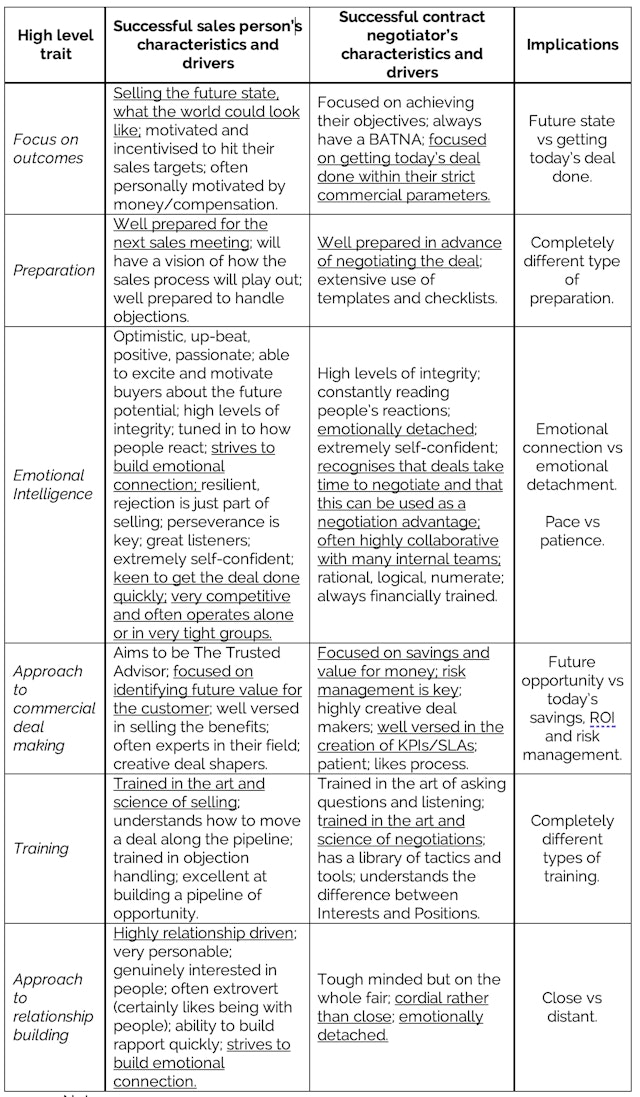Are great agency salespeople best placed to be your negotiators?
I’ve had three conversations in the last two weeks with experienced salespeople who all said: “Selling is the opposite of negotiating – it requires completely different skills and characteristics.”

Selling is the opposite of negotiating – it requires completely different skills and characteristics
It reminded me of my days working on big transformation and IT infrastructure programs. There would often be a lead salesperson to find and shape the deal, then a service delivery director paired with a lead negotiator to finalize the SoW, Ts&Cs and SLAs/KPIs.
So, for this month’s column I’m exploring:
-
Negotiation in the context of selling
-
The traits of great agency salespeople compared to great negotiators
-
What it means for agencies
Negotiation in the context of selling
A typical agency sales cycle (assume this isn’t an RFP) looks something like this:

The reality is the negotiations start as soon as you make contact with a customer. However, the style and dialogue is very different than at the end of the sales cycle when you’re negotiating contracts.
Prior to ‘contracts and KPIs,’ the sales lead is building rapport with the client, discovering/creating/solution-building and ‘soft-negotiating’ what’s in and out of scope at what price. This is usually done with the budget holder/senior-stakeholder and their team.
At the ‘contracts and KPI’ stage, the negotiation style changes – it gets more formal and, critically, it’s assumed that the creativity phase is over. This is often done with a different person on the client side, and for big deals/brands it often involves procurement. There’s a warning sign here – if the deal is high-value, and procurement hasn’t been engaged early, you may find yourself on the wrong end of a very difficult negotiation and the introduction of new competitors.
A comparison of great agency sales traits v great negotiators
So, now that we have a contextual understanding about when negotiation starts and the different styles involved, let’s look at the personality traits.
This analysis is based on my personal experience as well as various web-based sources. It’s not comprehensive, but it definitely illustrates the point.

Notes:
-
Sources: Mike Lander, Forbes, Oxford College or Procurement and Supply, HBR, Business News Daily, Sales Hacker, PipelineCRM
-
Some of the high-level traits have been taken to extremes to illustrate the point
Conclusions: what does this mean for agencies?
There are enough fundamentally different traits of great salespeople and great negotiators to conclude that agencies need to adapt their sales processes and skills training.
My recommendations are:
-
For smaller deal sizes (say £50k-£100k TCV) and where your salespeople are primarily negotiating with the budget holder/senior stakeholder, make sure all your sales people are trained in agency/sector-specific negotiation foundation skills.
-
For bigger deals (say >£100k) and when you’re facing tough negotiations/procurement, you need to inject different skills into the process. Engage a seasoned negotiation coach/advisor to provide insights, frameworks and challenges to improve the quality of the outcome.
To make sure I wasn’t simply deluded, I asked a veteran business developer in the agency world, Richard McHardy, founder of mchardycollective.co.uk, for his views. This is what he said: “Great agency sales/business development professionals listen, qualify and ask open-ended questions in order to uncover the truth behind an opportunity. Emotions run high when the opportunity matches the agency’s purpose, offers a long-term valuable relationship or simply puts the agency in creative dreamland.
“The potential for the opportunity to deliver on any combination of the aforementioned criteria should determine how the agency shows up and approaches the opportunity – the bigger the prize, the more you should consider including expert support in the shape of a negotiation coach/advisor. But that doesn’t always happen, or it happens too late.
“I run the matchmaking channel between specialist agencies and brands where the deals vary in size – on the basis of this article I’ll be thinking a little differently about things in the future.”
If you have any comments or questions about anything in this article, I’d love to hear from you. Drop me an email.
Mike Lander is the chief executive officer and founder of Piscari, which empowers agency leaders with better negotiation skills and insights into how procurement professionals work.
Content created with:

Piscari
Sign more profitable deals for your business. Learn the techniques of effective sales negotiation. Gain deep insights from an ex-Procurement Director
Find out more
